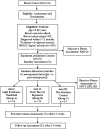Design of a randomised intervention study: the effect of dumbbell exercise therapy on physical activity and quality of life among breast cancer survivors in Malaysia
- PMID: 28588911
- PMCID: PMC5321396
- DOI: 10.1136/bmjgh-2015-000015
Design of a randomised intervention study: the effect of dumbbell exercise therapy on physical activity and quality of life among breast cancer survivors in Malaysia
Abstract
Background: Participation in physical activity has a positive impact on the overall health and quality of life, whereas physical inactivity is associated with a poor prognosis among breast cancer survivors. Despite the health-enhancing benefits of physical activity, the majority of Malaysian breast cancer survivors are not physically active. This paper presents the design of a randomised study to evaluate the feasibility and effect of exercise therapy intervention using light resistance dumbbell exercise to promote active lifestyle and improve the quality of life of breast cancer survivors in Malaysia.
Methods/design: This is an intervention study of a 12-week exercise therapy that will explore and compare the effects of light resistance and aerobic exercise on physical activity level and quality of life components in 102 female breast cancer survivors. Major eligibility criteria include histologically confirmed diagnosis of breast cancer stages I-III, 3-12 months post-diagnosis, and absence of any disorder contraindicating exercise. Participants will be stratified based on menopausal status (pre-menopause vs post-menopause) and then assigned randomly to one of three groups. Participants in group A will participate in a three-times weekly supervised resistance exercise using light resistance dumbbells; participants in group B will participate in a three-times weekly supervised aerobic exercise; while participants in group C (control group) will be given aerobic exercise after completion of the intervention. The primary end points include physical activity level and quality of life components. The secondary end points are body mass index, body composition, total caloric intake, and waist-to-hip ratio.
Discussion: Although there have been many studies of resistance exercise in breast cancer survivors, this is the first study using this specific mode of resistance. Findings will contribute data on the feasibility and effects of light resistance dumbbell exercises, and provide knowledge on the physical activity intervention programme that will maximally promote better overall health and well-being of survivors.
Conflict of interest statement
Competing interests: None declared.
Figures


References
-
- Howlader N, Noone AM, Krapcho M et al., eds SEER Cancer Statistics Review, 1975–2009 (Vintage 2009 Populations). Bethesda, MD: National Cancer Institute; http://seer.cancer.gov/csr/1975_2009_pops09 (accessed 21 Aug 2012).
LinkOut - more resources
Full Text Sources
Other Literature Sources
